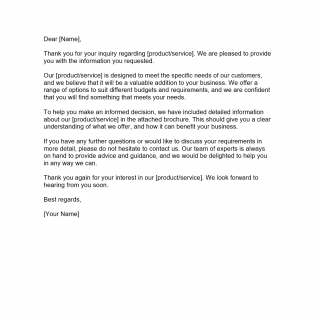Reply Letter for Inquiry
A reply letter for an inquiry serves to respond to a previous inquiry letter and provide the sender with accurate and relevant information. The main purpose of the letter is to address any questions or concerns raised in the inquiry and maintain a positive relationship between the sender and recipient.
The letter typically consists of a polite and professional greeting, a brief introduction, a statement of appreciation for the inquiry, and a response to each of the questions or concerns raised in the inquiry. It is important to be clear and concise in the response and avoid providing any unnecessary or irrelevant information.
The important fields to consider when writing a reply letter for an inquiry include the sender's name and contact information, the date of the inquiry, the sender's questions or concerns, and any relevant information that was requested. It is important to ensure that all information provided in the response is accurate and up-to-date.
The parties involved in a reply letter for an inquiry are the sender of the inquiry letter and the recipient of the reply letter. The letter is important for maintaining a positive relationship between the two parties and ensuring that any questions or concerns are addressed in a timely and professional manner.
When writing a reply letter for an inquiry, it may be necessary to request additional information or documents from the sender. It is important to clearly state any requirements for additional information or documents and provide a deadline for when they should be provided.
Examples of practice and use cases for a reply letter for an inquiry include responding to job inquiries, customer inquiries, and academic inquiries. The strengths of this type of letter include providing clear and concise information to the sender and maintaining a positive relationship between the parties involved. The weaknesses include the potential for miscommunication or misunderstandings and the possibility of providing irrelevant or inaccurate information.
Alternative forms to a reply letter for an inquiry include phone calls, emails, and in-person meetings. These forms may be more appropriate depending on the nature of the inquiry and the relationship between the parties involved.
Sample of Reply Letter for Inquiry
Dear [Name],
Thank you for your inquiry regarding [product/service]. We are pleased to provide you with the information you requested.
Our [product/service] is designed to meet the specific needs of our customers, and we believe that it will be a valuable addition to your business. We offer a range of options to suit different budgets and requirements, and we are confident that you will find something that meets your needs.
To help you make an informed decision, we have included detailed information about our [product/service] in the attached brochure. This should give you a clear understanding of what we offer, and how it can benefit your business.
If you have any further questions or would like to discuss your requirements in more detail, please do not hesitate to contact us. Our team of experts is always on hand to provide advice and guidance, and we would be delighted to help you in any way we can.
Thank you again for your interest in our [product/service]. We look forward to hearing from you soon.
Best regards,
[Your Name]
The letter affects the future of the participants by maintaining a positive relationship and ensuring that any questions or concerns are addressed in a timely and professional manner. The letter is usually submitted via email or mail and should be stored for future reference.
When writing a reply letter for an inquiry, it is important to be polite and professional, provide accurate and relevant information, and address all questions or concerns raised in the inquiry. No additional documents are typically required when writing this type of letter.
Overall, a reply letter for an inquiry is an important communication tool that helps to maintain positive relationships and provide accurate information to those who seek it.

